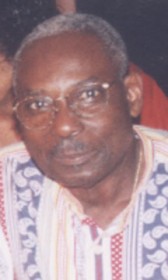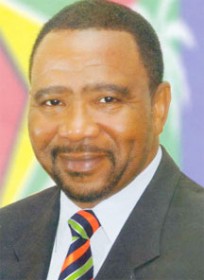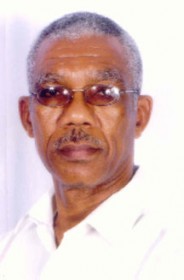The PNCR yesterday announced that its presidential candidate for the upcoming general elections would be elected at a special congress to be held on February 19, next year.
The party has, however, ruled out a ‘one person, one vote‘ system, citing transparency and cost as influencing factors. Speaking at the PNCR’s news briefing at Congress Place yesterday, General Secretary Oscar Clarke said it would be too difficult to execute and not cost-effective. “The committee itself felt that this was a very onerous task being asked of the party to be able to go to every party group in every region to hold a one-man-one-vote election and it was going to be costly,” Clarke stated. “You talk about being able to have a system that is transparent which means that all of these various persons who are running will have to get their scribes, their people to go and check … you’ll have to get a plane to fly people around the country…,” he added.
He likened it to a general election and said the party simply could not afford to go that route. PNCR Leader Robert Corbin added that the system of having party delegates represent their groups in the voting is in keeping with the party’s constitution and ensures that all party members are involved in the selection process. He noted that in the past there had been concerns about the transparency of the process and stated that to go with the one-man-one-vote idea could exacerbate the situation. “There have always been concerns of transparency and all kinds of allegations and to manage and supervise a system where you’re going to have 800 or 600 sets of elections could also multiply those problems. We thought that it is better to improve the system … ensure that you have a transparent system at the party’s congress because it’s not only going to affect the congress,” Corbin said.

He noted that the highest offices of the party are voted on by the same system and it should therefore be good enough to decide who would be the presidential candidate.
Meanwhile, reading from a prepared statement Clarke detailed the process by which a decision was arrived at and presented the timelines for the selection procedure. He was the Convener of the Presidential Candidate Pro-cess Committee, which was set up following the July General Council meeting and was mandated with hammering out selection process.
Clarke said that party groups will be meeting from November 27 to December 4 to make and formally document their List of Nominees for the presidential candidacy.
From December 5 to December 12, the Regional Secretaries are to receive the Group Nominations. They will then convene a Special Extended Regional Commit-tee meeting, including a representative from each of the Groups which submitted Nominations, to formally agree and document the Regional List of Nominees.

Where no functioning Regional Committee exists, the Party Group Chairman or Secretary will send the Group Nominations, in the specified format, directly to him, Clarke stated. By December 18, all Regional Secretaries are to submit their Regional List of Nominees, endorsed by all of the Group delegates attending the Special Extended Regional Commit-tee meeting, to the Party’s General Secretary. This is to be followed by the General Secretary preparing a National List of Nominees by December 22. “All nominees are to be asked to formally notify the Party General Secretary, in writing, their acceptance of the nomination.
The nominees who accept their nomination will be required to submit a CV along with a brief biographical presentation to the Presidential Candidate Process Committee,” Clarke stated. He added that the Committee will then prepare a list of these nominated candidates for submission and approval of the Central Executive Committee (CEC). The approved list of nominees is to be publicised by December 30.
Meanwhile, in what is a first for the party, Clarke revealed that town-hall style meetings could be held across the country from January 3 to January 31, “as far as practicable.” The nominees will get a chance to address those meetings, Clarke added, with the party to convene its Special Congress to elect its presidential candidate by February 19.

Clarke emphasized that the move to identify a presidential candidate does not detract or changes the party’s commitment to form a broad alliance to contest the 2011 general elections, saying it was its “first priority.”
The party had said previously that the alliance candidate would have to be arrived at by consensus with the other signatories to the partnership.
The individuals to so far publicly announce their interest in being the party candidate are Vice-Chairman Basil Williams, retired Brigadier David Granger former minister Dr. Faith Harding and the now incapacitated former party chairman Winston Murray. Murray has been hospitalised in a comatose state since November 11, as a result of cerebral hemorrhaging.
In an invited comment on the selection process, Granger said he thinks that it is “fair and transparent and likely to produce the best candidate.” He added that it is democratic in the sense that all members who belong to party groups will have their opinions represented at the regional and national levels. “Bear in mind that it’s the first time a system of primaries is being tried by any party here.
The only problem is that it might be slow because all groups have to express their views,” he added.





